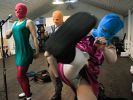Eye For Film >> Movies >> Pussy Riot: A Punk Prayer (2013) Film Review
Pussy Riot. Everybody's heard the name. #WeArePussyRiot was once a popular Twitter tag and Madonna wrote 'Pussy Riot' on her back during a Moscow gig. For Nadia, Masha and Katya, though, being Pussy Riot means something different. In March 2012 they were arrested for their part in it, going on to spend long months in a labour camp. This documentary tells their story.
Revolution. Power to the people. Communism. Glasnost. Perestroika. Democracy. These terms come and go in a country that has always been conservative at heart. Notably, while Jón Gnarr has sat in parliament in Iceland and Jello Biafra barely missed out on US presidential candidature, in Russia punk has never really got off the ground, let alone made a political impact. In a country whose ruler spent 16 years in the KGB and is expected to remain in power for at least another decade, speaking out is difficult, being heard even more so. But Pussy Riot have been heard. Leaping up to the altar in the Cathedral of Christ the Saviour, they broke so many taboos in one go that the Russian press could not ignore them.

Getting as close as it is possible to get to its subjects, given the prison sentence, this film uses archive footage and interviews with family members to tell the story of a historic moment brought about as much by accident as design. What stands out more that anything is just how young these women are, how amateurish, how disorganised. Like angry young people all over the world they have simply stood up and shouted at injustice. The impact of their actions seems to have taken them by surprise. The dignity of their response, however, marks them out as something more remarkable.
Of course, there are plenty of people who will tell you it was all a meaningless publicity stunt. It's true that Nadia's father is a well known opponent of received political wisdom, but the ease with which some critics assume he must be the brains behind the operation is indicative of one of the problems the band say they're trying to tackle. The scandal in the cathedral wasn't just about blasphemy or anti-Putin lyrics. People are also upset because they wore short skirts. Despite the passionate feminism of early Bolshevik revolutionaries, socially acceptable roles for Russian women are still very much restricted to marriage and motherhood. That it should be women who rebel is particularly shocking.
Getting at the depth of these issues whilst keeping the film engaging is not an easy task, but it's impressively managed here. We see the popular demonstrations against the band. Orthodox believers with long hair, beards and skulls on their black t-shirts (a warning about the perceived threat to their faith) look like renegade Hell's Angels. They refer to the band members as witches and speak wistfully of a time when such women would be burned. In the courthouse things are more civil but there is a clear official refusal to acknowledge the political implications of the trial - the only charges are equivalent to breach of the peace, stretched out of all proportion, and there is no sympathy for arguments about artistic expression.
What does become difficult here is balance, in part because many of Pussy Riot's critics are so aggressive as to make their case for them. One elderly woman speaks poignantly about what the cathedral means to her and implies that she feels their actions are like a home invasion. Briefly, in court, Masha expresses sadness at having distressed such people. It might have been good to see more of this but, on the other hand, it's difficult to see how it could have been fitted in to an already busy film.
Released just as Russia passed a law forbidding positive discussion about gay people - one of the many groups whose rights Pussy Riot have shouted for - this is a film with heavy political resonance. It's a film which argues that saying their name with pride isn't enough - that the spirit of Pussy Riot, and punk more generally, lies in doing something about it. Even if you're not sure what.
Reviewed on: 29 Jun 2013

















